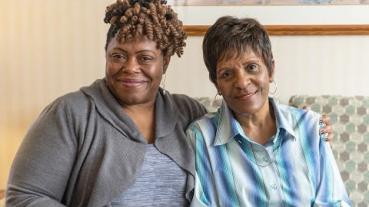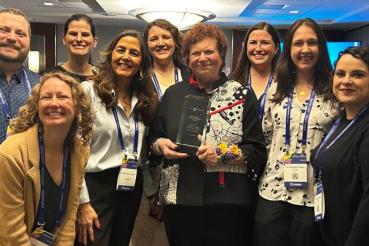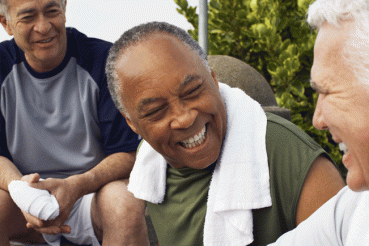Although you're entering your "golden years," you may worry that being an older adult actually means you'll have more tarnish than shine.
But a lot of the things people fear about growing older aren't necessarily true, says Carl Lambert, Jr., MD, a family medicine physician at Rush.
"You do go through changes in your 70s and beyond. But many of the adverse effects of aging that people assume are inevitable are not," he says. "It's about lifelong maintenance. If you adopt healthy habits and stick with them throughout your life, you improve your chances of living longer and being an active senior."
Here, Lambert addresses 8 common myths related to aging and offers advice on things you can do to stay healthy, vibrant and sharp as you age.
1. Myth: Exercise isn't safe for older adults.
Though many people believe this, the opposite is true. Studies have shown that lack of physical activity raises your risk of obesity, heart disease and diabetes, among other conditions. And it can result in more doctor visits and hospitalizations.
Take control: Regular, moderate physical activity keeps your heart and lungs strong and helps you manage stress. And weight-bearing exercises — especially walking — improve both bone health and balance. "Having strong bones and good balance can mean fewer falls," Lambert says. "That's vital, because falls can be devastating for seniors."
Note: If you're embarking on an exercise program for the first time, talk with your doctor to determine the best regimen based on your general health and health conditions.
2. Myth: You won't have sex anymore.
"Unless you have a serious health condition that makes vigorous cardiovascular activity risky, you can enjoy an active sex life at any age," Lambert says.
Take control: It's true that some seniors experience physical or emotional issues that affect their ability to have or enjoy sex. But many problems can be addressed to make sex possible, and pleasurable, again.
For instance, over-the-counter lubricants and prescription vaginal estrogen therapy can help with vaginal dryness. There are many treatments for erectile dysfunction and low testosterone in men, and testosterone patches can improve sexual response in women.
Trying different positions can also lessen sexual discomfort caused by arthritis or other age-related conditions. "I know it can be embarrassing to discuss sexual problems with your doctor," Lambert says. "But we're here to listen — and often, our suggestions can help."
3. Myth: Older adults need much less sleep.
It's true that older adults need less sleep than younger adults — but only 30 to 60 minutes less. "Seniors shouldn't skimp on sleep," Lambert says. "You should still get six to seven hours of sleep a night."
Take control: If you're not sleeping well, there can be many culprits, from poor sleep habits (e.g., irregular bed and wake times, daytime napping) to chronic health issues. Certain medications, caffeine, alcohol and nicotine can also cause loss of sleep.
If sleeplessness is affecting your health or your ability to enjoy life, you may need to see a sleep specialist.
4. Myth: Arthritis is inevitable in seniors.
Time can take a toll on your joints. But according to the National Institutes of Health, only half of all people over the age of 65 suffer from the most common form of arthritis, osteoarthritis. And studies show that which joints are affected and the severity of the disease may be more closely linked to risk factors other than aging-related wear and tear, including obesity, genetics and previous joint injuries.
Take control: To reduce your risk of osteoarthritis, Lambert recommends taking steps — literally.
"Regular, moderate physical activity strengthens the muscles around your joints, helping to prevent damage to your cartilage," he says. "Exercise also helps you keep off the extra pounds that can put extra stress on your joints."
Just make sure to mix it up: Repetitive stress on joints for long periods of time can cause the wear and tear that may eventually lead to osteoarthritis. So if you lift weights one day, go for a long walk or ride your bike the next.
If you already have arthritis, Lambert suggests trying aquatic (water) exercises. "They'll give you a great workout that's easy on the joints," she says.
Studies have established that not only can seniors learn new things, but that it's beneficial to make learning a lifelong pursuit.
5. Myth: Anti-aging skin products can "take the years off."
Can those expensive face creams and topical treatments really reverse the effects of aging, such as wrinkles, sagging skin and brown spots? Yes and no, says Lambert.
"There are some topical products with an acid component, as well as treatments offered by dermatologists, that exfoliate the top layers of skin and make your face appear smoother," he explains. "But the effects are temporary."
Take control: You can, however, protect your skin to help keep it looking younger, longer:
- Don't smoke. A recent study revealed that smokers are more likely to get wrinkles around the mouth, under-eye bags and jowls at a younger age than nonsmokers.
- Wear sunscreen, even on cloudy days, to prevent sun damage that can prematurely age your skin.
- Quench your skin's thirst. Lack of hydration can lead to dry skin, which is more likely to wrinkle and appear damaged. But drinking extra water won’t help parched skin. Instead, apply hydrating moisturizer right after washing, while your skin is still wet. This will help lock in the moisture.
6. Myth: "You can't teach an old dog new tricks."
Contrary to this popular saying, our brains continue to develop through and beyond middle age. "Studies have established that not only can seniors learn new things, but that it's beneficial to make learning a lifelong pursuit," Lambert explains.
Take control: Scientists say that unlike kids and young adults, the best way for seniors to learn is not to reinforce what they already know, but to challenge long-held beliefs and assumptions, and view things from different perspectives.
Try taking a class on a subject you've never studied before, learn a new language or skill, or find challenging puzzles to solve. "Like stretching your muscles before you exercise," Lambert says, "stretching your brain will keep it strong, flexible and healthy."
7. Myth: You'll gain weight because your metabolism slows down as you age.
While it's true that your metabolism is slower — meaning your body doesn't burn calories as fast as it used to — weight gain in seniors is not a given. They key is to adjust your habits.
Take control: To maintain a healthy weight, focus on the following:
- Eat smarter. Because your body needs fewer calories as it ages, it's important for seniors to watch both what and how much they eat. A moderately active 65-year-old man needs 2,400 calories each day; a 65-year-old woman needs 1,800.
- Get physical. Seniors should strive for 150 minutes of moderate intensity cardiovascular activity and two sessions of muscle-strengthening activities each week. "Whether you’re going to the gym to exercise, or doing active activities like gardening, walking the dog or dancing, the key is to be as active as possible," Lambert says.
- Stress less. Stress can lead to weight gain, both because of its biological effects on the body and because stressed-out people often turn to comfort foods. Physical activity can help you de-stress. In addition, try relaxing activities like yoga or meditation.
"We should all strive to be healthy, active seniors," Lambert says. "When I see people in their 80s and even 90s out there experiencing new things and enjoying life, it's a wonderful thing."
8. Myth: You'll feel lonely and isolated.
It's understandable for seniors to feel forlorn, especially if they've lost a significant other or live far from family. But your social life doesn't have to dwindle as you age. In fact, you may have more time and energy to devote to relationships than when you were working full-time and raising kids.
Take control: "There are many opportunities for older adults to meet people — through a faith community, by joining a book club or gym, by taking a class or volunteering," Lambert says.
"And membership programs for seniors, like our own Rush Generations, offer a variety of engaging social activities. Getting involved can also help you feel more energized and connected to your community."
Ready to help change the conversation about aging? Join activist and author Tracey Gendron, PhD, for a virtual lecture about confronting agism. Sign up for the event, happening Wednesday, May 7.




